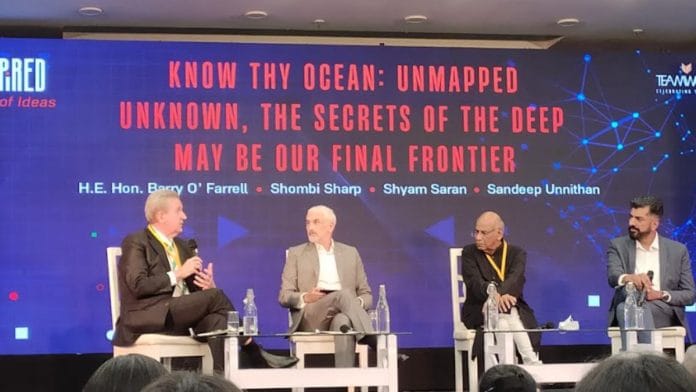New Delhi: If the “dark oceans are the womb of life”, then protecting them is the responsibility of every nation.
“From the protected oceans, life emerged. We still bear in our bodies as in our blood, in the salty bitterness of our tears, the marks of this ancient past,” Shyam Saran, president of the India International Centre (IIC) told a rapt audience, quoting United Nations diplomat Arvid Pardo.
Saran illustrated the importance of a recently signed global treaty to protect the world’s oceans. A veteran diplomat himself, Saran was one of the panellists at the TeamWork Art’s ‘Festival of Indias’ at IIC on 15 April.
Last month, United Nations delegates from over a hundred countries came together to sign the High Seas Treaty—a pledge to protect 30 per cent of the world’s oceans by 2030. The agreement was made after marathon negotiations that lasted over 38 hours.
“In diplomatic parlance, this is known as negotiation through exhaustion. So, most of them (the delegates) went to sleep, and when they woke up, they found that they had signed on to something,” Saran said, as the audience broke into laughter.
Also read: Climate change deadlier than cancer, widening gap between haves, have-nots, says new UN study
The historic Treaty
The talk, titled ‘Know thy Ocean: Unmapped, Unknown, the Secrets of the Deep may be our Final Frontier,’ featured Australia’s High Commissioner to India Barry O’Farrell and Shombi Sharp, UN resident coordinator for India alongside Saran on the panel. “I’m the only non-trained diplomat on this panel. I’m a recovering politician,” Farrell quipped.
The conversation drifted from the contributions countries have made to keeping oceans clean to the importance of preserving biodiversity. But mainly, the talk concentrated on the Treaty and the multilateral process of such agreements.
“Pardon the pun, but the agreement has made a sea change in terms of people coming together,” Sharp said.
The Treaty is considered “historic” because its protective powers venture beyond national jurisdictions. It’s the first legal mechanism to set up marine protected areas on the high seas. It also complements another agreement, Kunming-Montreal Global Biodiversity Framework, made last year to protect and restore 30 per cent of the earth’s terrestrial and water ecosystems by 2030.
Unfulfilled promises, G20 summit
Before the High Seas Treaty can be enacted, it must be formally adopted and ratified by member countries.
“This is just the beginning. But it is the beginning in which you provide that framework through which we can continue to amplify those policies, those approaches, and those people-motivated activities,” Farrell said, referring to the beach and riverfront clean-up activities.
Saran offered a more sobering view.
“How is money going to be raised?” he asked, adding, “What is the record on the implementation of the Paris Agreement, particularly on the financing part? So, I’m not holding my breath. But yes, I will recognise that this is a very important step forward.”
The Paris Agreement is a treaty signed in 2015 to limit global warming to “well below” 2 degrees Celsius above pre-industrial levels by the turn of the century. The world has already warmed 1.1 degrees Celsius, the Intergovernmental Panel on Climate Change (IPCC) has warned. And slowing down climate change requires enormous amounts of funding and technology transfer from capable rich countries to poorer ones.
But a 14-year-old pledge by wealthy countries to mobilise $100 billion by 2020—a meagre amount compared to what is required for an energy transition—remains unfulfilled.
Also read: No longer an exclusive Lutyens’ Delhi library. IIC digitises rare collections for all
“This was an example where we see the importance of multilateralism, the importance of reforming multilateral institutions,” said Sharp. “Everywhere you look, we are moving forward very, very quickly. The speed of destruction in the environment is still a little bit faster, so it’s the chase of the moment. But I’m very optimistic in terms of the speed of how things are picking up.”
India’s role as G20 president could help reinforce the work needed to propel action, the panellists said.
“You cannot think in terms of doing anything worthwhile if you think you can do it alone. If you’re playing a global role, are you ready to play a more effective regional role on this agenda item? If you are able to do that, then yes, I think the G20 summit can be a major sort of occasion for us to demonstrate India’s commitment to multilateralism, and the commitment to how we work together to deal with global challenges,” said Saran.
(Edited by Ratan Priya)






